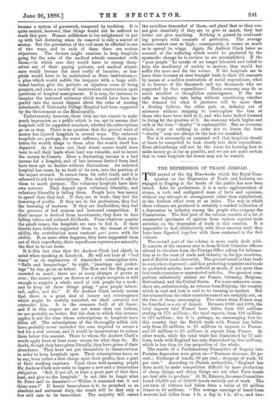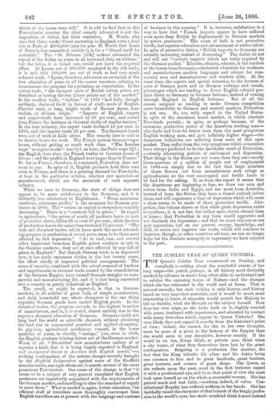THE DEPRESSION OF TRADE ABROAD.
THE second of the big Blue-books which the Royal Com- mission on the Depression of Trade and Industry are engaged in flinging at the heads of the public has now been issued. Like its predecessor, it is a mere agglomeration of atoms, a rude and undigested mass of facts and opinions, without any attempt at arrangement other than alphabetical, or the feeblest effort even at an index. The way in which these volumes are produced is certainly a marked indication of a depression in industry among the people who compose the Commission. The first part of the volume consists of a lot of unassorted specimens of opinion from various reputed trade societies on the depression of trade in this country. It is impossible to deal satisfactorily with these answers until they have been digested together with those contained in the first volume.
The second part of the volume is more easily dealt with. It consists of the answers sent in from British Consular officers abroad to circulars from the Foreign Office asking for informa- tion as to the state of trade and industry in foreign countries, and of British trade therewith. The general result is that trade is everywhere depressed ; and that protecting countries and trade in protected articles, have suffered as much, if not more than free-trade countries or unprotected articles. Our greatest com- petitors industrially abroad are France, Germany, Belgium, Switzerland, and the United States. For some unknown cause, there are, unfortunately, no returns from Belgium, the country which in coal and iron is said to be running us hardest. But the returns from the other countries named are certainly not, on the face of them, encouraging. The return from France may be described as a cry of despair. Between 1880 and 1884, the total imports into France have fallen from 201 millions sterling to 173 millions ; the total exports, from 138 millions to 129 millions ; but it is, perhaps, an encouraging fact for this country that the British trade with France has fallen only from 26 millions to 24 millions in imports to France, and 36 millions to 33 millions in exports from France. In other words, while the total trade has diminished by 37 mil- lions, trade with England has only diminished by five millions, which is less than its due proportion of the whole.
The results of a Parliamentary Committee of Inquiry into Parisian depression were given as—" Business decrease, 20 per cent. ; discharge of hands, 30 per cent.' stoppage of work, 12 per cent." According to French authorities, "England has done much to make competition difficult by mass production of cheap things, and cheap things are not what Paris hands are beat able to produce." At St. Etienne, the same Committee found 10,000 out of 60,000 hands entirely out of work. The out-turn of ribbons had fallen from a value of 93 million francs to 43 millions. "The average earnings of hand-loom weavers had fallen from 4 fr. a day to 1 fr. 25 c., and two-
thirds of the looms were still." It is odd to find that in this Protectionist country the chief remedy advocated is not the imposition of duties, but their remission. M. Worth, who says that three weeks' Court mourning in England costs a dead loss to Paris of £600,000 (alas for poor M. Worth that Louis of Bavaria has committed suicide !), is for a "liberal tariff for materials." The "St. Etienne [silk] makers advocated the repeal of the duties on yarns or an increased duty on ribbons," but the latter, it is found out, would not have the required effect. At Lyons, out of 300,000 employed in the silk trade, it is said that 100,000 are out of work or had very much reduced work. "Lyons, therefore, advocates an extension of the free admission of yarns to all the coarse numbers, refusing to countenance the proposal for a premium on exportation. In the cotton trade, "the cheapest sorts of British cotton prints are described as having thrown Alsace prints out of the market." In the woollen trade, " fashion " in 1884 "had fully, though suddenly, declared itself in favour of stuffs made of English Cheviot wool, or long, bright wools of Buenos Ayres, Aus- tralian, or African origin." "Imports of English carpets and carpet-stuffs have increased by 30 per cent., and ousted from France the business in Oriental cloths of similar texture." In the iron industry, the export trade declined 12 per cent. in 1884, and the import trade 23 per cent. Ten thousand hands were out of work at Lille alone. The remedy here is said to be shorter hours for work. The French system favours longer hours, without getting so much work done. "The London wage" in engine-works' was 80. an hour, the Paris wage 41d.; the English time nine, the French twelve to fourteen hours of labour ; and the profits in England were larger than in France." So far as France, therefore, is concerned, Protection does not seem to pay. In spite of it, English products hold their own even in France, and there is a growing demand for Free-trade, at least in the particular articles, whether raw materials or manufactured, which are the materials of each separate industry.
When we turn to Germany, the state of things does not appear to be more satisfactory to the Germans, and it is distinctly less satisfactory to Englishmen. "From maximum exertions, minimum profits," is the summary for German pro- ducers in 1883. The "return on capital is everywhere steadily decreasing." There is a "constant fall in prices." In regard to agriculture, " the prices of nearly all products have, in spite of protective duties, fallen 25 or even 30 per cent., while the cost of production has in the same time increased 75 per cent." "The iron and chemical trades, which have made the most astound- ing progress in production of recent years, seem to be those most affected by this depression." "As in coal, iron, and several other important branches, English prices continue to rule in the German markets ; they are at once affected by any fall of prices in England." But though German trade is so depressed now, it has made enormous strides in the last twenty years, the effect chiefly of improved political arrangements. The sense of security, combined with the actual removal of burdens and impediments to internal trade, caused by the consolidation of the German Empire, have turned German energies to com- mercial and manufacturing life, and it is fast being converted into a country as purely industrial as England.
The result, as might be expected, is that in German markets, in all articles of great bulk, of simple manufacture, and daily household use, where cheapness is the one thing requisite, German goods have ousted English goods. In the chemical trades, the progress extends to the highest branches of manufacture, and is, it is stated, almost entirely due to the superior chemical education of Germans. Germans could not long lead the world as scientific chemists without obtaining the lead also in commercial practical and applied chemistry. In pig-iron, agricultural machinery, cement, in the lower qualities of yarns, in shoddy, " mungo," jute, even in cloth, the English producer is being driven out of the German market. Worst of all, " Diisgeldorf now manufactures cutlery of so superior a kind, that it is being largely exported to England, and re-exported thence to America with English marks,"—a striking confirmation of the serious charges recently brought by the Sheffield Independent against some of the Sheffield manufacturers, amongst whom are, it asserts, several of the most prominent Fair-traders. One cause of the change is that "it seems to be a subject of very general complaint that English producers are imperfectly acquainted with the requirements of the German market, and unwilling to alter the standard of supply to meet them." What is needed is, again, better education, "an efficient staff of travellers more thoroughly conversant than English travellers are at present with the language and customs of business in this country." It is, however, satisfactory in a way to hear that "French imports appear to have suffered even more than British by displacement in German markets by native producers." The cause of both is not protective tariffs, but superior education and advancement of native talent. In spite of protective duties, "British imports to Germany are actually increasing instead of decreasing." The duties do not and will not "exclude imports which are really required by the German market." Educate, educate, educate, is the burthen of the lesson from Germany,—technical education for workmen and manufacturers, modern languages and science for com- mercial men and manufacturers and workers alike. At the same time, the reports call special attention to the lowness of rates at German ports and on German railways and canals, advantages which are tending to divert English colonial pro- duce direct to Germany in German bottoms, instead of coming through England in English bottoms. But of all the causes assigned as tending to make German competition more formidable in German and neutral markets, Protection is not one. So, too, with regard to the United States. In spite of the enormous home market, in which absolute Free-trade prevails ; in spite, or perhaps because, of the enormous productive power of the American working man— who feeds and lives far better even than the most prosperous English working man, and gets infinitely higher wages—the American industries are suffering from want of this open market. They suffer from the very symptoms which economists have always predicted to be the inevitable result of Protection, —closely alternating periods of excitement and depression. That things in the States are not worse than they are—nearly three-quarters of a million of people out of employment in 1884—is simply due to the fact that large numbers of those thrown out from manufactures seek refuge as agriculturists on the vast unoccupied and fertile lands to be had for the asking. If, as from the report it seems that the Americans are beginning to fear, we draw our corn and cotton from India and Egypt, and our meat from Australia, instead of from the States, they have a dismal outlook before them, and will experience a time of depression which will cause a clean sweep to be made of those protective tariffs. Alto- gether, this volume shows us that while great depression exists everywhere, it is not less, but rather more severe abroad than at home ; that Protection in any form would aggravate and not diminish the depression ; and that we must rely not on our past reputation, but on our present energy, knowledge, and skill, to retain and improve our trade, which will continue to improve, though, as other countries advance, we can no longer hope for the absolute monopoly or supremacy we have enjoyed in the past..



































 Previous page
Previous page